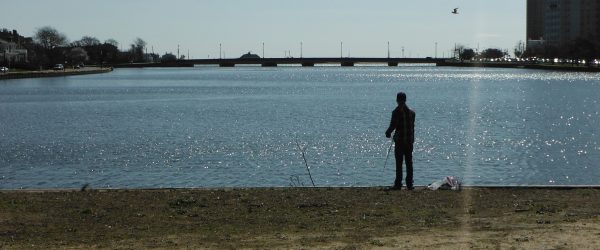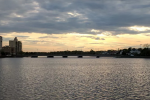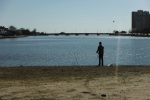Deal Lake – the State of Affairs
Princeton Hydro's Souza on condition of the lake
To the Editor, Asbury Park Sun,
In response to Mr. Marty Martino’s recent Letter to the Editor on whether Deal Lake is contaminated;
“Implying that Deal Lake is polluted and unsafe is a mischaracterization of lake’s actual condition –
1. Yes, Deal Lake is on the State’s 303D list of impaired waters. The reason being is that the lake is often (but not always) non-compliant with the State’s standard for pH and phosphorus, as defined by NJAC 7:9B. The reason for this is that during periods of intense weed or algae growth the pH of the lake becomes elevated (pH 8-9) due to algae and weed photosynthesis. This is directly a function of the lake being eutrophic. The elevated pH does not constitute a health risk for either biota or humans. The elevated phosphorus concentrations are a function of storm water runoff and its sources include lawn fertilizer, pet waste, goose waste and the phosphorus leached from soil during rainfall events.
2. As is the case with over 90% of the lakes and reservoirs in NJ, Deal Lake is classified as a eutrophic waterbody. This means that it is overly productive and prone to excessive aquatic weed growth and algae blooms. All of the State’s most heavily used recreational lakes are eutrophic. Eutrophication is the result of excessive nutrient (phosphorus and nitrogen) loading to the lake; with the primary source of those nutrients being storm water runoff. For over a decade the DLC has had in place a NJDEP reviewed and approved lake and watershed management plan. Through this plan we have secured funding that has been used to implement storm water improvement projects and to support cooperative initiatives with municipal and county government to conduct, as funding becomes available, projects that improve the quality of storm water runoff entering the lake.
3. Yes at times the concentration of fecal coliform or E. coli in the lake exceeds the State’s bathing limits as defined by NJAC 7:9B. Again this is not a consistent problem, but it is frequent and typically occurs immediately after a rainfall event. As such, people need to be careful when wading in the lake and the lake is not open to swimming. Again the cause for this is improperly or inadequately treated storm water runoff and the largest sources of the bacteria are avifauna and pet waste. The DLC and local governments have implemented a number of measures to decrease geese densities, stop people from feeding geese and ducks, and educating the public about picking up after their pets, all of which are aimed at decreasing bacteria inputs to the lake.
4. Deal Lake is not under any special health advisory regarding the consumption of fish caught in the lake. The fish health advisory affecting Deal Lake is the same health advisory affecting other lakes throughout the state. There is no health risk issue unique to Deal Lake relative to the capture and consumption of fish.”
Stephen J. Souza, Ph.D.
President, PrincetonHydro.com: Consultants to the Deal Lake Commission
Note: Dr. Souza is a nationally recognized expert on the environment of coastal lakes, who has locally lectured at Rutgers and Monmouth University; we are fortunate that he has served as the Commission’s Environmental Consultant for many years – The DLC
[Photos courtesy of Deal Lake Commission]
[This letter represents the opinion of its writer and is not representative of any opinion of the Asbury Park Sun staff. All readers are welcome to submit Letters to the Editor to news@asburyparksun.com for our consideration. For guidelines on letter-writing and submission, click here.]
————————————————————
Follow the Asbury Park Sun on Facebook, Twitter and Instagram.
The Asbury Park Sun is affiliated with the triCityNews newspaper.







